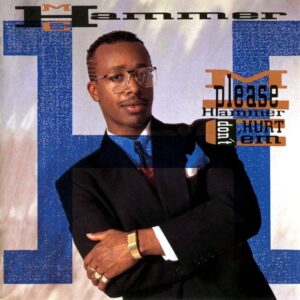Capitol 92857
Producer: M.C. Hammer
Track listing: Here Comes the Hammer / U Can’t Touch This Have You Seen Her / On Your Face Help the Children / Dancin’ Machine / Pray / Crime Story / She’s Sort and Wet / Lets Go Deeper

June 9, 1990
21 weeks (nonconsecutive)
By 1989, M.C. Hammer’s pop-oriented brand of rap music had already proven successful. His Capitol Records debut, Let’s Get It Started, topped the Top Black Albums chart and peaked at number 30 on the Top Pop Albums list, spawning two top five Hot Rap Singles, “Pump It Up” and “Turn This Mutha Out.” Yet few could have predicted the enormous success of his follow-up album, Please Hammer Don’t Hurt ‘Em.
As a youth, Stanley Kirk Burrell had two loves: baseball and music. He idolized James Brown, but it was his passion for baseball that led him to the Oakland Coliseum to watch the A’s. One day, A’s owner Charlie Finley caught a glimpse of the 11 -year-old Burrell performing a James Brown-styled dance routine in the stadium parking lot. Finley was impressed enough to invite him to work as a batboy. Burrell was soon dubbed Little Hammer because of his resemblance to home run king “Hammerin’ ” Hank Aaron.
Although Hammer’s pro baseball dreams didn’t pan out, his ties to the A’s did help him launch his recording career. Two A’s players invested $20,000, allowing him to launch his Bustin’ Records. He sold his first single, “Ring ‘Em,” out of the trunk of his car and eventually recorded an album called Feel My Power. The album and Hammer’s dance-floor antics were enough to secure a contract with Capitol, which advanced Hammer $750,000 to record additional songs. The album, with the new songs, was retitled Let’s Get It Started.
Please Hammer Don’t Hurt ‘Em was recorded on the Bust It Mobile Studio Bus while Hammer was on tour in support of Let’s Get It Started. “We did it when we could,” Hammer says, “during the day when we were traveling down the road and at night after the shows. It was a work in progress made in America, from city-to-city, from state-to-state.”
For the musical backbone of several songs on the album, Hammer turned to his heroes. He recorded rap remakes of the Chi-Lites’ “Have You Seen Her,” Earth, Wind & Fire’s “On Your Face,” and the Jacksons’ “Dancing Machine.” Elsewhere, he sampled Prince and Marvin Gaye significantly enough to give them co-writing credits. “They’re all people that I think are great musicians,” Hammer says.
Yet it was Hammer’s take on Rick James’s 1981 hit “Super Freak,” titled “U Can’t Touch This,” which drove Please Hammer Don’t Hurt ‘Em up the album chart. Hammer cleared his sample of the track with James’s lawyers. Yet James, who was opposed to having his music sampled, didn’t know about Hammer’s use of music until he heard the song on the radio. By that time, it was too late. “U Can’t Touch This” peaked at number eight a week after Please Hammer Don’t Hurt ‘Em hit the top of album chart, as Capitol deleted the single to spur on album sales.
With “Have You Seen Her” and “Pray” later becoming top five hits, Please Hammer Don’t Hurt ‘Em became the rapper’s grand slam, racking up the most weeks at Number One since Prince’s Purple Rain.
THE TOP FIVE
Week of June 9, 1990
1. Please Hammer Don’t Hurt, ‘Em M.C. Hammer
2. I Do Not Want What I Haven’t Got, Sinead O’Connor
3. Brigade, Heart
4. Pretty Woman, Soundtrack
5. Poison, Bell Biv Devoe
